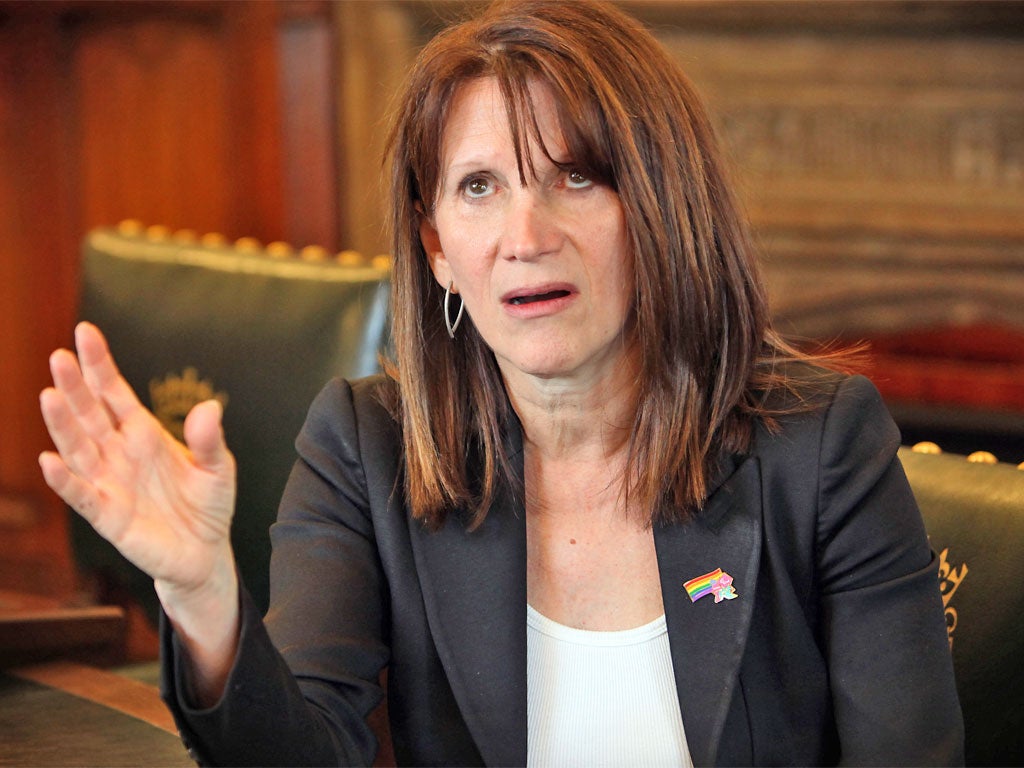Lynne Featherstone: Church leaders are 'fanning the flames of homophobia'
Equalities minister tells Andrew Grice gay marriage will become law by 2015

Lynne Featherstone, the Equalities minister, has accused church leaders of "fanning the flames of homophobia" as they oppose her controversial plans to legalise gay marriage.
In an interview with The Independent, the Liberal Democrat minister appealed for a "calm and reasoned debate" and for her critics to stop using "inflammatory" language after she formally launches the Government's consultation exercise today.
But Ms Featherstone risked fuelling the anger of church leaders and Conservative MPs who oppose equal civil marriage for same-sex couples. They had hoped to use the process to defeat the plans because the public and interest groups will be asked whether they support the idea.
Ms Featherstone made clear that her mind is already made up, giving a "cast-iron guarantee" that civil gay marriage would become law by the next general election in 2015.
"There is no rolling back whatsoever," she said. "The essential question is not whether we are going to introduce same-sex civil marriage but how."
The Home Office Minister warned her church critics that their attacks would backfire, accusing them of trying to scupper gay marriage so they would not come under pressure from their congregations to accept religious marriage for same-sex couples. The Government is not proposing that; the change in the law would apply to civil marriages in register offices and other places, such as hotels, allowed to perform them.
Regretting the language used by church leaders who have accused David Cameron of acting like a "dictator" and condemned gay marriage as "grotesque", she said: "It adds nothing to the debate. It inflames. On these issues, we have a responsibility in leadership positions to make sure we don't fan the flames of homophobia. I totally respect all of the religious views and understand they are strong and genuinely felt. But to use such inflammatory language does not help the debate and does not help their cause." She added: "I don't want to see any polarisation between religious beliefs and gay rights. It is not a competition."
The Equalities minister offered an "absolute reassurance" that her plans would not force churches to allow same sex couples the right to a religious marriage. "It is not legal and it will remain not legal to marry people of the same sex on religious premises," she said. She dismissed a claim by the Archbishop of York, John Sentamu, that the Government could not change the law on marriage without the backing of the Church of England's General Synod: "My understanding is that Parliament can legislate to do what it wishes."
Ms Featherstone is more polite about her Tory critics – even though 50 backbenchers may vote against the plans and another 50 could abstain. "I think the Conservative Party has moved on from where it was," she said. "As Liberal Democrats, we like to enlighten people."
There was a minor skirmish between the two Coalition parties last autumn over whether Mr Cameron or Ms Featherstone was the driving force behind legalising gay marriage. "I am very grateful to David Cameron for his absolute commitment to this proposal," Ms Featherstone said. "It is a liberal idea, as you would expect from a liberal Equalities minister."
She insisted her plan would "hugely strengthen" the institution of marriage: "It is a very logical and very progressive step. It is illogical to say we have equality before the law but you can't have a civil marriage because you are gay."
But her description of marriage as "fabulous" does not extend to supporting Tory plans to reward it in the tax system. "It's an odd thing to say you need a cash incentive for it," she said.
Ms Featherstone conceded that the legal rights from gay marriage would not differ markedly from those stemming from the civil partnerships introduced by Labour in 2005. She also admitted that not all the 80,000 people who have entered civil partnerships would want to upgrade to marriage.
But she insisted the "genuine ask" in the gay community was to stop marriage being an "unattainable standard" from which they were excluded – such as making their public vows.
"It is about recognising that love is equal whatever your gender, about two people declaring their love for each other and saying 'till death us do part'," she said. "All politicians say they want to make the world a better place. I think this will do so."
Join our commenting forum
Join thought-provoking conversations, follow other Independent readers and see their replies
Comments